

The Russian authorities are preparing to celebrate the anniversary of their full-scale invasion of Ukraine, with the Russian Union of Afghan Veterans (RUVA) and the Night Wolves motorcycle club, known for their pro-Kremlin stance, joining in the festivities. In February 2014, even before the deployment of the “polite people,” these “special tourists” were secretly transferred to Crimea. Their mission was to conduct local reconnaissance, seize administrative buildings and military units of the Armed Forces of Ukraine, and spread rumors about an impending invasion by NATO troops and Right Sector units. Together with Igor Girkin, these fighters held local MPs at gunpoint, forcing them to vote in favor of the referendum, and also eliminated protesters to create the illusion of popular support for the annexation. For their role in the Crimean adventure, 200 people were recognized with medals and certificates of merit from Putin, though the list of awardees leaked to the media in June 2014 caused a major scandal. The Insider's investigation, nine years later, revealed that many of the first occupiers had passed away, and 26 of them are currently on trial. Nevertheless, some managed to advance their careers in politics and business.
Content
How it all began
Lawyer, judo wrestler, customs officer and writer
Burglar, bandit, robber and murderer
How occupiers died
How it all began
On February 28, 2014, a military IL-76 aircraft with the flight number RA 76599 departed from Chkalovskiy airfield, carrying 200 members of the RUVA and Night Wolves motorcycle club bikers on board. The plane was en route to Novorossiysk, and the passengers were armed with knives, knuckles, baseball bats, and five Kalashnikovs. Some individuals had not packed adequately, so they were provided with new jackets, sneakers, and baseball caps during the flight. Once the plane landed in Novorossiysk, the group was transferred to the Black Sea Fleet auxiliary vessel KIL-158, which transported them to Crimea.

Before shipping
Following their arrival in Crimea, a temporary headquarters was established at the Yalta sanatorium, with Franz Klintsevich, chairman of the RUVA, assuming the lead role. Sergei Markov, a pro-Kremlin political analyst, served as the political officer. The group announced that the peninsula was being infiltrated by Western intelligence agents, that Right Sector militants were preparing to launch an attack from the land, and that a U.S. landing force was being readied from the sea.
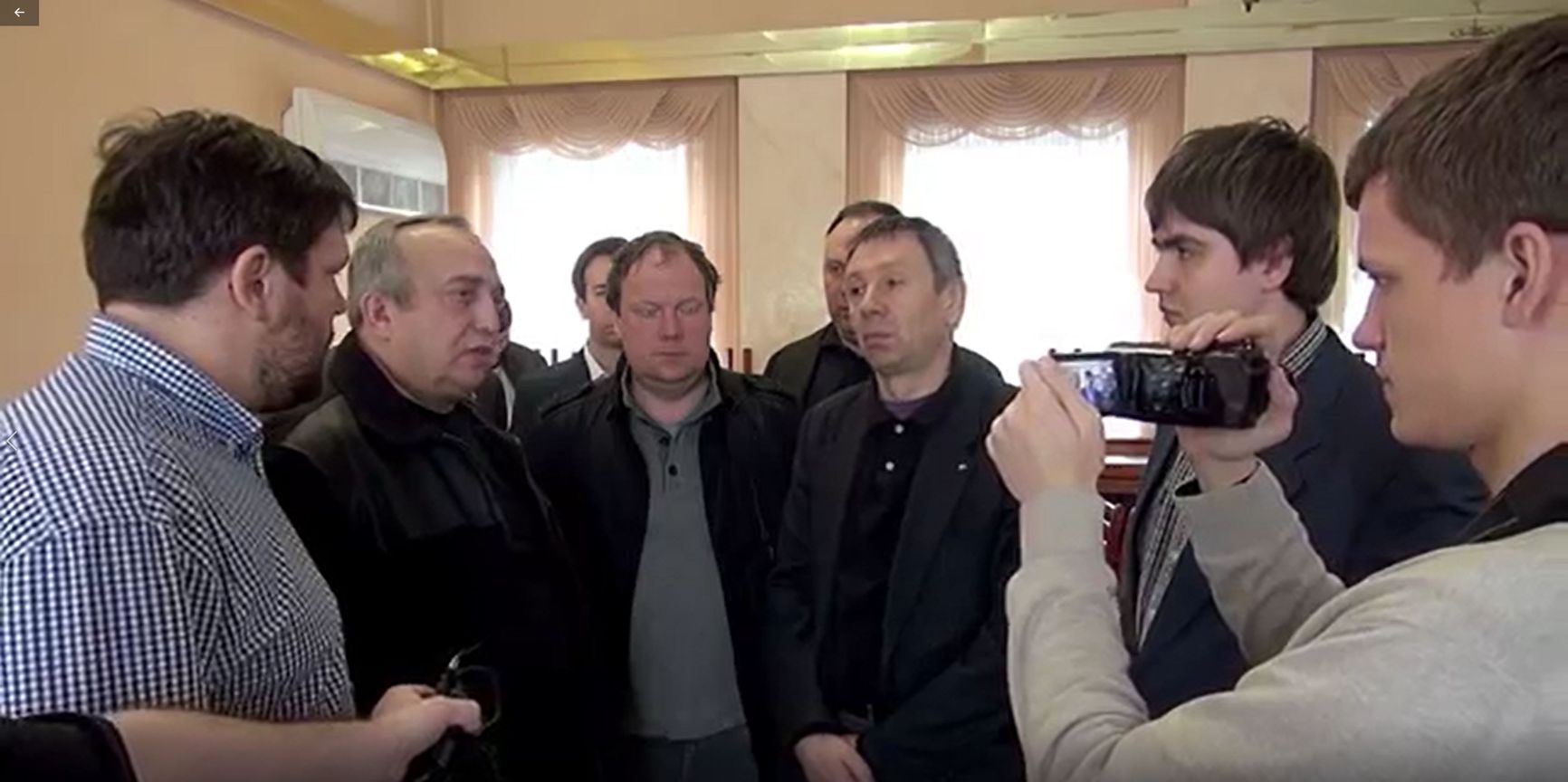
RSVA headquarters in Yalta: Franz Klintsevich (second from left) and Sergey Markov (third from right)
Following ideological indoctrination, the “special tourists” were divided into multiple groups and dispatched to various cities in Crimea to assess the operational situation and organize pro-Russian rallies.
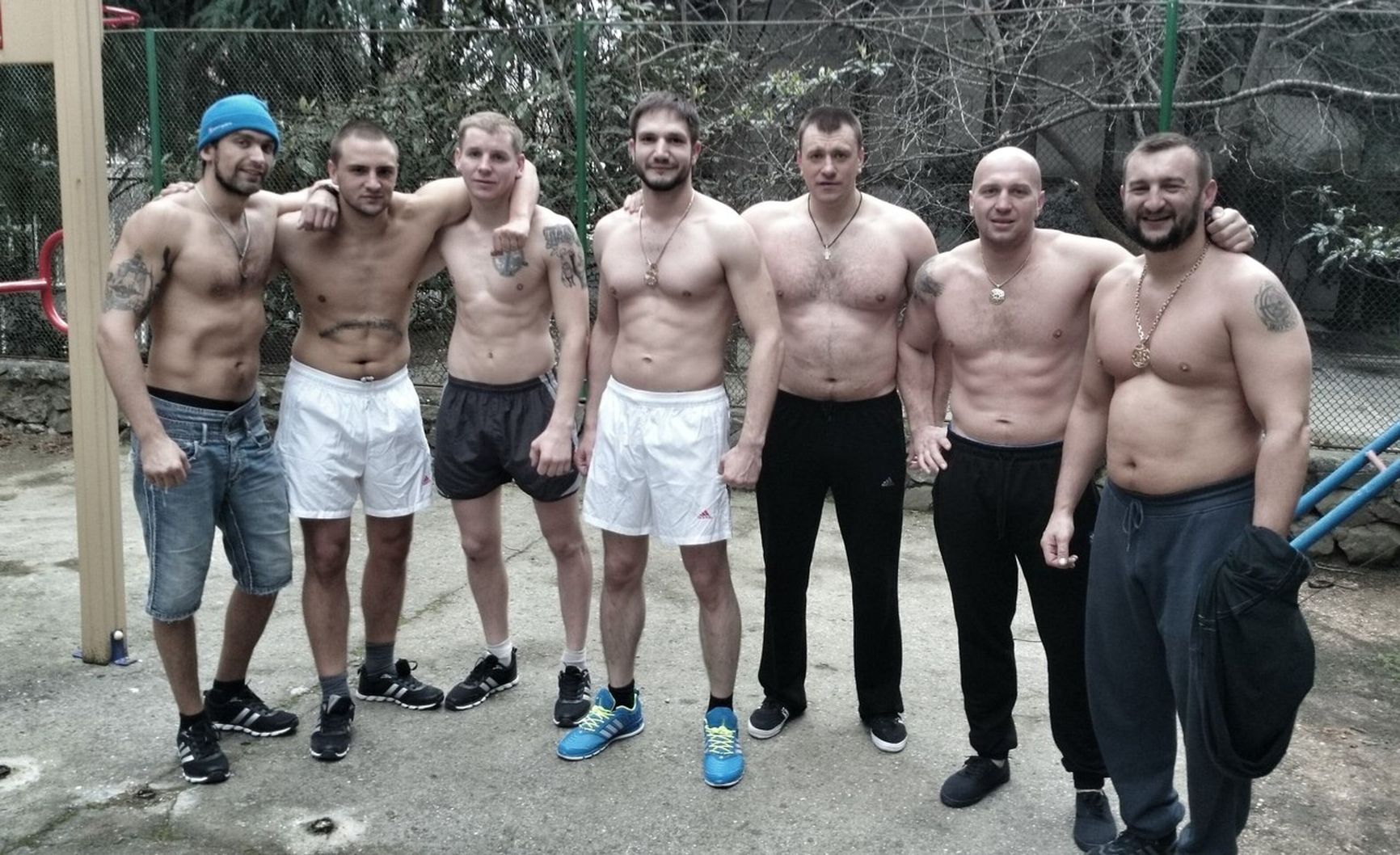
“Liberators” in Crimea
Dmitry Galochkin, a former militant of the FSB unit Alfa (number 49 on the awardee list) was tasked with ensuring the security of the rally in Yalta. He recounted how Franz Klintsevich had summoned him and Oleg Ptashkin, a member of the United Russia party, to the State Duma and given them just two hours to pack before leaving for Crimea. “And we rounded up 200 tourists,” Galochkin boasted.
During the late 1990s, Galochkin served as a bodyguard for NTV owner Vladimir Gusinsky. After the TV company was dissolved, Galochkin and his former colleagues from the FSB advocated for the creation of a trade union for non-government security firms. At the time of his arrival in Crimea, the former Chekist was under police surveillance for hooliganism in the workplace using firecrackers. During a rally in Yalta, Galochkin's squad assaulted a young boy who chanted “Crimea is Ukraine!” Despite his violent actions, Putin honored Galochkin with a medal and certificate of honor for his active participation in the seizure of Crimea, which propelled his career. Galochkin joined the Central Council of United Russia supporters, served in the Public Chamber and the Chamber of Commerce and Industry of the Russian Federation and as an expert in the State Duma. Currently, he is a member of the leadership of the Officers of Russia organization. Additionally, according to The Insider's sources in the security agencies of Moscow, the ex-FSB officers renders “protection” services to nearly fifty private security companies.
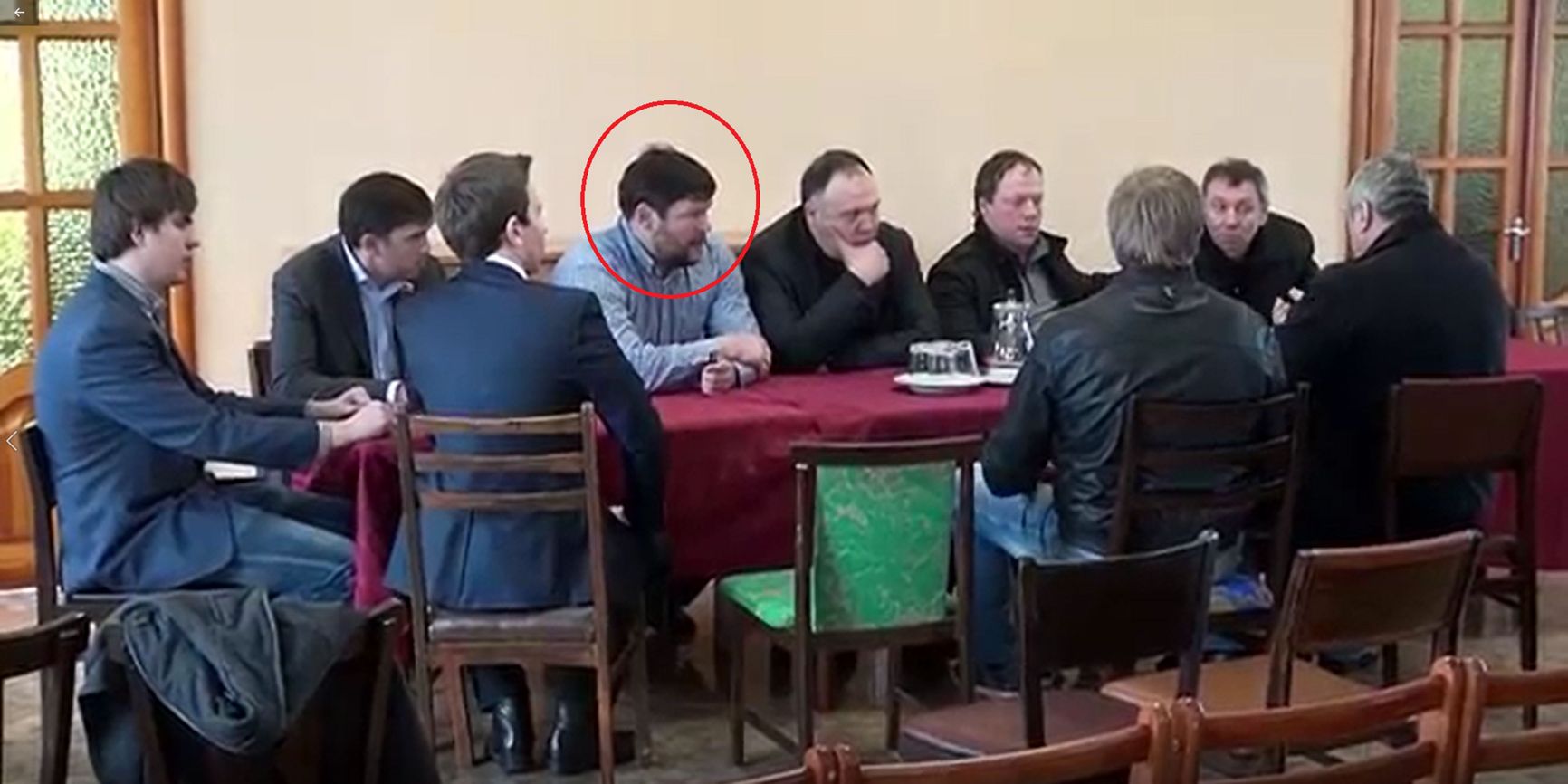
Dmitry Galochkin
Oleg Ptashkin (No. 6), mentioned by Galochkin, held the position of head of the directorate of United Russia's Central Council of Supporters in February 2014. Prior to that, he had worked as a journalist at NTV and as a creative producer at Channel One. However, he was let go in 2009 and, in response, Ptashkin and another fired Channel One journalist, Elkhan Mirzoev, barricaded themselves in an Ostankino television center studio and threatened to set themselves on fire unless they were reinstated. The court ultimately reinstated Ptashkin, but he was later recruited to head the agitation and propaganda department of the pro-Kremlin Young Guard movement, and he continued to move up the party ranks from there.
While in Crimea, Ptashkin was responsible for leading a group that spread anti-Ukrainian propaganda and rumors about the supposed arrival of Right Sector forces. His efforts did not go unnoticed and upon his return to Moscow, he was appointed as the head of the Ivanovo regional office with the headquarters on Novy Arbat. Currently, Ptashkin holds the position of first deputy head of the city of Dzerzhinsky in the Moscow Region, having put his unsuccessful career as a journalist behind him.
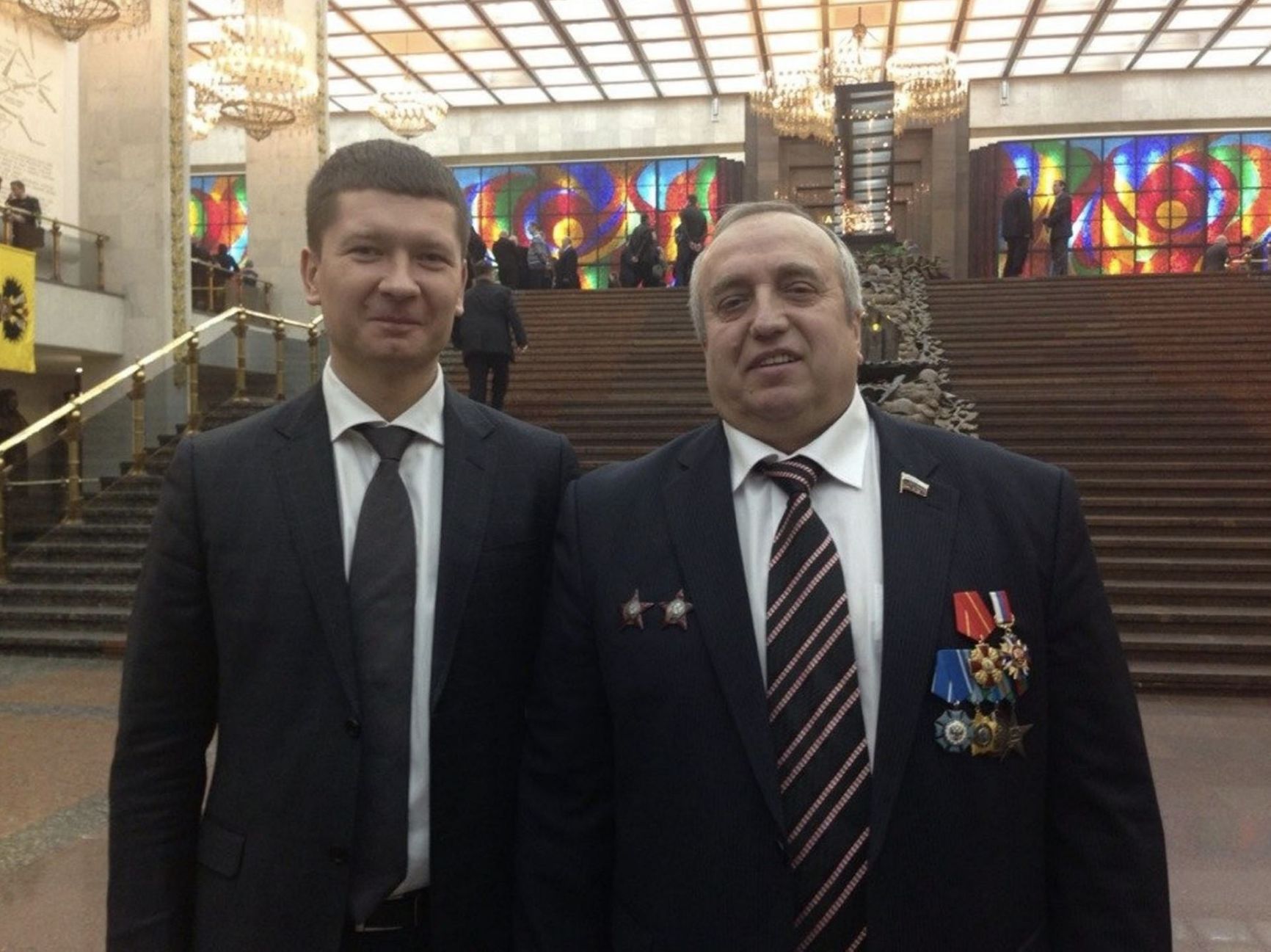
Oleg Ptashkin and Franz Klintsevich
Ildar Rezyapov, (No. 123, call sign “Politico”), a former paramilitary guard from Sterlitamak, rose through the ranks after his special assignment in Crimea. He founded the Party of Russian Veterans and participated in multiple election campaigns, albeit with little success. However, Rezyapov found a new role as a star commentator on the propaganda TV show 60 Minutes, hosted by Yevgeny Popov and Olga Skabeeva, providing his views on the Kremlin's desired narrative about the invasion of Ukraine. Additionally, Rezyapov has been informing the FSB and the Interior Ministry about cultural figures and Moscow's oldest theaters, searching for any signs of LGBT propaganda in their repertoires. When asked about his funding sources, Rezyapov claimed that sympathetic businessmen were supporting him.
Three other militants also entered the political arena: Ivan Dorogikh (No. 85) was elected as a deputy in Podolsk, Vyacheslav Stegalov (No. 144), a former policeman who had killed a pedestrian by running him over with his car, became a member of the Public Chamber in Dolgoprudny, and biker Konstantin Karakovsky (No. 147) was appointed head of the upscale housing community Snegiri in the Istra district near Moscow. Despite being a defendant in a criminal case for a falsified university diploma, Karakovsky's appointment was not questioned. It was later discovered that Karakovsky, a vocal opponent of the West, and his wife regularly vacationed in Daugavpils, Latvia, where they own an apartment.
Khostai Mubarak Shah (No. 47), a native of Afghanistan, received a much-cherished membership card of the Kaluga Public Chamber. As a young man, he participated in anti-government activities by posting leaflets during the night. He was later transferred to the USSR, where he pursued a teaching degree and was recruited by the GRU. When Soviet troops invaded Afghanistan, Mubarak betrayed his fellow countrymen who sympathized with the Mujahideen to the local authorities, and as a result, the peasants intended to execute him for treason. After the pro-Soviet regime collapsed, he fled to the USSR and settled in Kaluga, where he worked as a mathematics teacher at Lyceum No. 48.

Khostai Mubarak Shah
Franz Klintsevich, who had served in Afghanistan as a military interpreter in the GRU subversive detachments, helped him settle in his new place. During his trip to Crimea, Mubarak Shah conducted explanatory work among the Crimean Tatars, convincing them not to resist the occupants. Now he frequents Kaluga's media outlets and during elections agitates to vote for Putin and United Russia. Curiously, in an interview with Nika TV, Mubarak said that he strongly condemned one country attacking another, even though he was wearing a Defense Ministry medal “For the Return of Crimea” on his jacket.
Prior to his mission in Crimea, Roman Matsulevich (No. 7), an entrepreneur, rented a small beer kiosk in Moscow. However, he now holds the position of Assistant First Deputy Chairman of the Council of Ministers in Crimea and is responsible for liaising with local security agencies. During the annexation of Crimea, Matsulevich was responsible for supplying food to the people's militia regiment and had a talent for arranging parties for higher-ups. His hard work and attention to detail were recognized, and he was eventually invited to join the government, where he quickly rose in the ranks.
Lawyer, judo wrestler, customs officer and writer
Yevgeny Kurilov, who ranks as No. 83 on the awardee list, used to participate in rallies in Crimea where he would wear camouflage and chant slogans such as “Nazism and NATO will not pass!” However, he now wears expensive suits and works at the Justice and Security law firm. The most prominent feature in his office is a letter of commendation from Putin. “Yevgeny Kurilov is a skilled human rights advocate whose extensive experience in pre-trial conflict resolution across various branches of law enforcement allows him to successfully defend his clients' interests,” says the law firm's website. In legal circles, Kurilov is regarded as one of the top “fixers” in Moscow's judicial arena.
Ilya Razumov (No. 169), a judo wrestler who participated in the storming of the parliament in Simferopol, also proudly displays his letter of commendation from Putin. Despite his involvement in the Crimea conflict, Razumov went on to compete in a judo tournament in Prague as a member of the Russian veterans' team. Later, he joined a team from the Moscow police department and participated in the World Police and Firefighters Games in the U.S., where he won a silver medal, despite never having served in law enforcement and only holding a freelance certificate from the Directorate of Internal Affairs in Moscow. Although the Ukrainian authorities alerted European officials that Razumov was among the invaders in Crimea, there was no response.

Ilya Razumov (far right) in Washington
Two years ago, Razumov moved to Crimea and now heads the Alushta branch of the military-patriotic club Grifon, established by GRU veterans.

Letter of commendation from Putin
Valery Galubauskas (No. 139) is another “special tourist” who took part in the Crimea conflict. In 2014, Galubauskas worked at the Bryansk customs office, and he posted pictures on his social media account of Kalashnikov assault rifles that he and his fellow travelers brought with them to Crimea. Journalists they asked the prosecutor's office to investigate the matter of how Galubauskas had obtained the firearms. However, the prosecutors did not respond, while Galubauskas kept on boasting to schoolchildren about his heroism in protecting Crimea from Nazism during the courage lessons he conducted.

In 2017, the customs officer retired and was deprived of the right to visit the medical center where he had been receiving free outpatient treatment. He sued the medical center and presented a medal and a letter of commendation from Putin during the hearing. But the judge sided with the medical center.
In contrast, the Crimea mission had negative consequences for Karen Arutyunyan (No. 184), the general director of the Foundry and Mechanical Plant (LMZ) in Noginsk. In March 2020, he was barred from entering Ukraine by border guards at Kyiv's Zhuliany airport, resulting in the collapse of a profitable business deal with Ukrainian partners. Despite claims by his detractors that Arutyunyan did not participate in the Crimea conflict in 2014, and that he was only included on the awardee list due to his sponsorship of RUVA, his troubles in Ukraine suggest otherwise.
Another fifty-six “special tourists” became businessmen. Some started selling alcohol, others took up garbage collection and funeral services, and some founded fight clubs. However, most of the “heroes” failed to succeed in business.
Take, for instance, Alexander Karpukhin (No. 15), who had called on AFU officers to surrender during the Crimea conflict, headed eleven companies in the Moscow region. However, almost all of his businesses went bankrupt in 2019. Likewise, Yuri Shorban (No. 45), the founder of waste removal firm Otkhody.Ru in Kaluga, went out of business in the same year. Vitaly Khromenkov (No. 118), who had appeared at a rally in Yalta as a grateful Crimean citizen, started Biznesprom LLC and New Cleaning Company LLC in Moscow. However, he quickly went bankrupt and was sued for unpaid loans. Khromenkov's comrade-in-arms, Konstantin Rachkovsky (No. 172), opened a funeral business in the capital, but was unable to compete with other businesses. Yegor Fedortsov (No. 185) established the Vityaz martial arts center in Noginsk, but due to low demand, the business had to close. Now, Fedortsov has shifted his focus to raising funds for the Russian army in Ukraine, and has been purchasing items such as quadcopters, warm socks, and underwear.
In 2015, Vadim Ufaev (No. 6) headed the Fabrichny Dom dry cleaner in Tver; however, it went bankrupt a year later. Yevgeny Shubenkin (No. 27) established a security firm called Legend in Penza, but it failed to sustain for even two years. Mikhail Chaikovsky (No. 119), a former paratrooper, had aspirations of becoming a banker and thus founded a microfinance organization in Moscow named “Cashalot”. Initially, the venture was prosperous, but in 2019, the tax service discovered financial irregularities leading to the closure of the credit institution.
In addition, Yevgeny Kuzmenko (No. 4), a GRU officer, was attached to the militant group in Bakhchisaray. He graduated from the Military University of the Defense Ministry and then served in the military unit 36184. Kuzmenko was born in Bakhchisaray and knew the city like the back of his hand. Another GRU graduate, reserve colonel Vladimir Koshelev (No. 5), was at the RUVA headquarters at the Yalta resort. Back in Afghanistan, he had been deputy commander of the 411th separate GRU special forces unit, which blocked the caravan trails from Iran. Upon retirement Koshelev turned to writing. Everyone expected him to write a book about the heroes of the annexation of Crimea, but, to all appearances, he failed to come up with suitable facts or locations.
Burglar, bandit, robber and murderer
During a pro-Russian rally in Yalta, biker Viktor Keller (No. 142) was involved in “neutralizing” Ukrainian protesters alongside FSB officer Galochkin. Keller had moved to Pyatigorsk from Kazakhstan in the late 1990s before eventually settling in Moscow. In 2004, he and a Pyatigorsk resident named Peter Yungers robbed the apartment of Tatiana Paukhova, the deputy general director of the Culture TV channel and stole a collection of 18th-century antiques valued at 21 million rubles ($300,000). The duo was apprehended, convicted, and sentenced to eight years in prison. While in Penal Colony No. 6 in the Stavropol Krai, Keller cooperated with the administration, and after four years, he was granted parole. Upon his release, he established the NGO “For Truth!” and became close to Alexander Zaldostanov (Surgeon), the leader of the Night Wolves biker club. For his involvement in the annexation of Crimea, Keller was awarded a medal and a certificate of merit from the President of Russia. Based on his social media presence, it appears that he is now a frequent guest of Ramzan Kadyrov's and the forunder of the NGO “Motherland without Corruption” in Kaliningrad.

Viktor Keller and Ramzan Kadyrov
Denis Podymkin (No. 40), originally from the village of Bolshoye Gryzlovo near Serpukhov, was a standout figure during the annexation of Crimea, particularly during the seizure of the Crimean parliament in Simferopol. However, at the time, he had a suspended sentence for assaulting an individual and was also a defendant in a criminal case related to an armed attack on the Gregory of Neocaesaria Church in Moscow. According to the investigation, on October 15, 2013, Podymkin, along with Alexander Dikusar, a native of Moldova, and Timur Ishmukhamedov, who hailed from Uzbekistan, broke into the church and held a gun to the head of the young priest, Mikhail Golubev. Afterward, the attackers took selfies in front of the altar and beat up a beggar at the entrance. The assault on the Orthodox church received widespread media attention, and the Russian Orthodox Church's press service even released a special statement claiming that the attackers were following instructions from Islamist centers abroad.

Denis Podymkin (far right)
Soon after their swift apprehension the “Islamist” attackers were released under a pledge not to leave the city. As the investigation slowly progressed, Podymkin traveled to Crimea, and returned with a presidential commendation and a medal. As a result, the investigators had no choice but to release the “hero.” A few years ago, Podymkin signed a contract with the Wagner Private Military Company and participated in the conflict in the “LNR.” Recently, he has been purportedly spotted alongside Wagner operatives recruiting inmates in the prisons of the Pskov region.
Andrei Ivonin (No. 48), a member of RUVA, had been on the federal wanted list when he boarded a military plane in Zhukovsky. He had been accused of embezzlement on a large scale and abuse of office during his time as head of the Priokskii Reserve, which is home to European bison. During the seizure of the Crimean parliament in Simferopol, he was with Igor Girkin, leading a detachment that blocked the deputies in the building. Upon returning from Crimea, Ivonin faced a trial and the possibility of a 10-year prison sentence. However, an amnesty was granted, resulting in the case being dropped.
Another Crimean “tourist,” Gennady Nikulov (No. 143), moonlighted as a bodyguard for Surgeon. He had a criminal record for robbery under his belt, and in 1997, he was arrested for carrying a gun while attempting extortion. Nikulov was one of the founders of the Night Wolves Motorcycle Club in the Tver region, which organized youth-oriented patriotic activities. However, the motorcycle club was dissolved by a court in Kalyazin in 2015 due to regulatory issues. Undeterred, Nikulov joined the security firms set up by former FSB officer Galochkin. He currently resides in Crimea, where he is busy forming self-defense units.
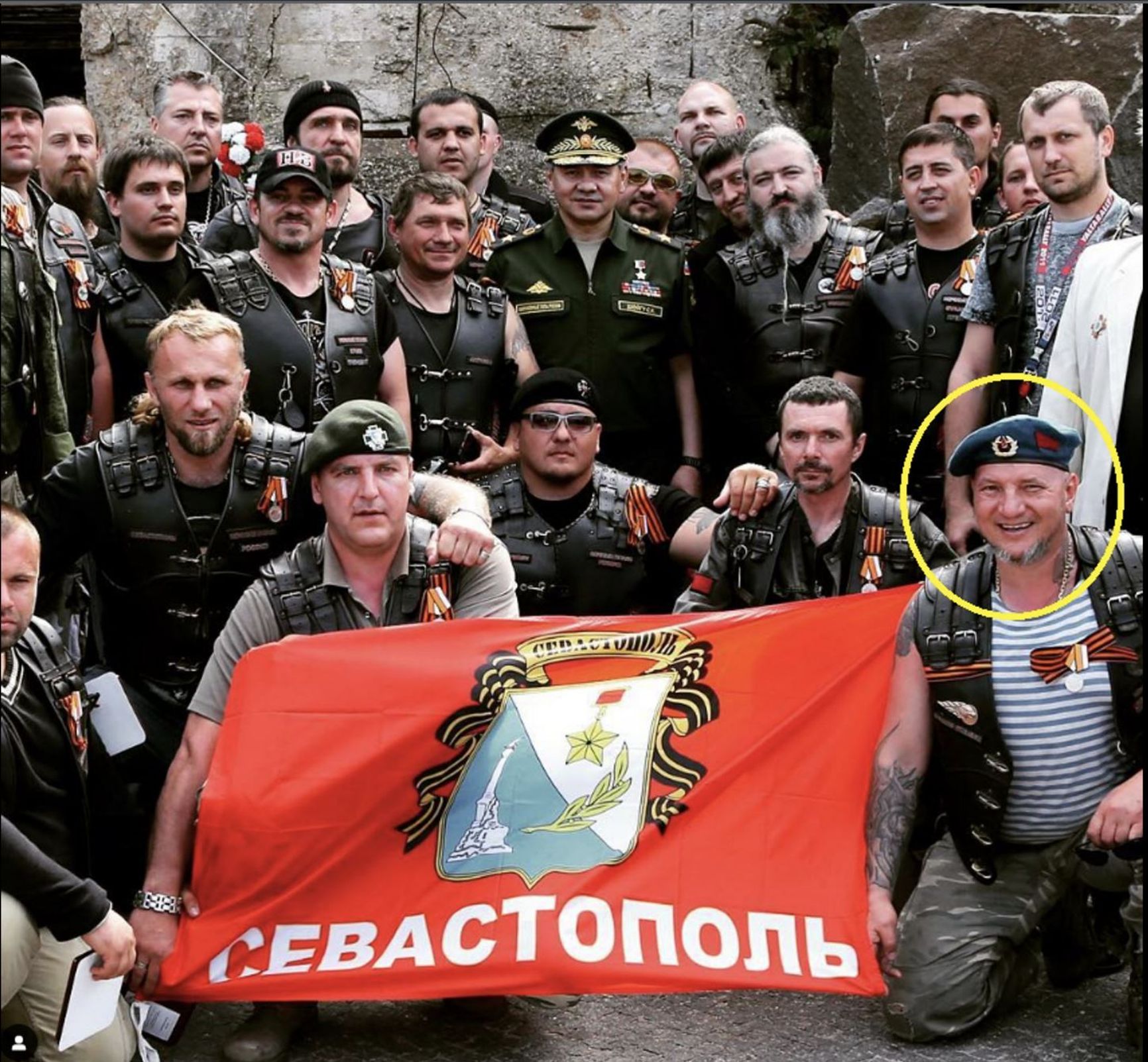
Gennady Nikulov at a meeting with Minister Sergei Shoigu
Vyacheslav Pechersky (No. 41), another individual involved in the takeover of Crimea, has a criminal past that includes serving time in prison for murder and malicious hooliganism. He was also involved in promoting the referendum for Russia in Alushta, where he made promises to local elderly citizens of a monthly pension of $1,000. Pechersky's current whereabouts are unknown, and there are rumors circulating in criminal circles that he went to fight in the “DNR” in 2014 and was hit by mortar fire along with biker Sergei Koptev. While Koptev's death is mentioned on the Night Wolves website, it is unclear who else was killed in the incident.
Another “fighter against Nazism,” Valentin Korshunov (No. 96), who led the Spartak fan club, also has a criminal record. However, his legal troubles occurred after the events in Crimea. In October 2021, during a Spartak-Leicester soccer match, he physically assaulted Alexander Shchegolev, an RBC journalist. Korshunov faced a potential prison sentence of up to 6 years for the attack, but the court in Tushino considered his past service to the country and instead sentenced him to 2 years of probation.
Fifty-six additional “liberators” involved in the Crimea takeover were held accountable for misconduct such as drunk driving and disorderly conduct. Furthermore, biker Sergei Rzhemovsky (No. 156) was imprisoned for killing a steward following his special mission to Crimea. He received a sentence of 8 years and 10 months from the regional court in Tver. According to a source within biker circles who spoke to The Insider, Rzhemovsky is presently fighting in the 2nd battalion of convicts for the Wagner PMC near Bakhmut. However, this information has yet to be verified.
According to another source from RUVA, approximately 30 of the initial Crimean invaders have passed away. Some perished in Syria, while others were killed in Ukraine. Some died due to drug overdoses or drunken driving accidents. The Insider has identified the deaths of 12 of these individuals.
How occupiers died
One instance involves Pavel Sarkisyan (No. 177), a RUVA member, who crashed his car in Anapa in November 2014. During his funeral traffic police blocked off half of the city, and a memorial sign was later erected in the square named after him. Another individual, Tver deputy Dmitry Lisichkin (No. 161), visited Crimea in 2015 to establish a regional branch of the Combat Brotherhood, but passed away due to a heart attack. During the takeover of the peninsula, Lisichkin compiled a list of Crimeans deemed untrustworthy and handed it over to the FSB.
Aleksei Yaroshevich (No. 160, call sign “Gusenichka”), a Belarusian who had had been serving with the Wagner PMC after the annexation of Crimea, was ambushed in Syria in 2017. Alexander Fetisov (No. 3), the leader of the local RUVA branch, passed away in Bryansk in 2018. Additionally, Yevgeny Kutepov (No. 106), a former army intelligence petty officer who led observer groups during the fraudulent referendum for Crimea's annexation to Russia, died in Tula.
Roman Khoper (No. 82), who had a prior conviction for theft, was responsible for guarding Klintsevich's headquarters in Yalta. Following the annexation of Crimea, Khoper became the nominal founder of eight shady companies that were allegedly used for money laundering. On October 19, 2019, Khoper died after being struck by a tractor near the town of Strunino in the Vladimir region.
In June 2020, Ivan Karanov (No. 158), a member of the Night Wolves who organized a bike show in Sevastopol, passed away due to heart failure. Additionally, Kirill Salo (No. 106), who had signed a contract with the 45th regiment of the Airborne Troops, died after detonating a landmine in Syria. Tagir Chekushin (No. 126), the oldest person on the awardee list, passed away from pneumonia in the same year. In his later years, Chekushin visited schools in Moscow to share stories with children about the heroes who helped to bring Crimea back to Russia.
In August 2021, Sergei Zatsarenko (No. 33), previously a member of the Vityaz reconnaissance company of Interior Ministry's troops, who had become deputy head of security for the Russian Ice Hockey Federation after the annexation of Crimea, died in a fatal road accident. Timur Boronov (No. 134), who had led RUVA fighters in Balaklava, passed away in February 2021 after battling a long illness. In September of the same year, Igor Novikov (No. 109), who had been brought to Crimea as a professional sapper, died suddenly in Bryansk. Just a few months later, a full-scale Russian invasion of Ukraine would begin.